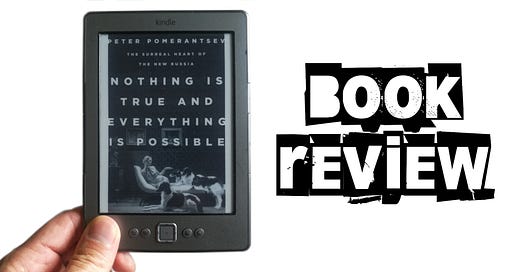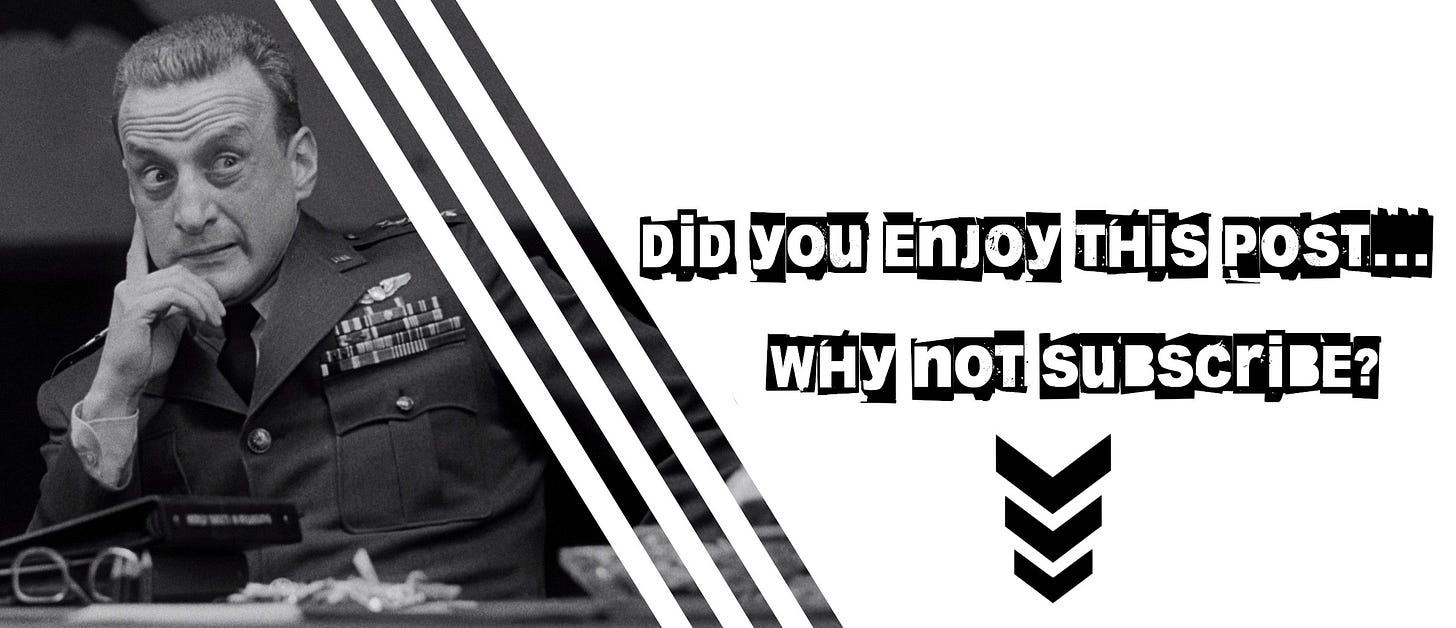Book review: Nothing is True and Everything is Possible
How Russia's recent past has predicted the West's future
Reading The Prize was work, reading Nothing is True was an addiction. A compelling story about the gestation of modern Russia, and how the forces that disrupted society there 20 years ago are now operating in the western democracies. To summarize in a sentence: Nothing is True takes us into the television studios and political centers around Moscow, where we discover how a debauched state maintains its power even as the lies and corruption are blatantly obvious to everyone.
There is a certain amount of spectacle in society today, performance art has trumped substance. Eric Weinstein has framed the deterioration as “kayfabe.” The term kayfabe refers to the fact that although pro wrestling is scripted, the audience goes along with the drama. Everyone is in on the joke, yet the show persists.
Unfortunately, kayfabe appears to increasingly dominate our lives. Public discourse becomes performance art, the show must go on. The current energy transition plan to fight climate change is unworkable and defies the laws of physics, yet we press on pretending it will all be fine. Sam Bankman-Fried is an egregious fraud and a criminal, yet he Tweets comfortably from the Bahamas while our government treats him like a child who stole a carton of milk. A whole class of citizens believe words are violence and they can be traumatized if they’re exposed to an opinion they don’t agree with. None of this is what you would expect from a serious society.
One of the best examples of the lack of substance in our system comes from a podcast I listened to six months ago. The guest explained what happens in a Senate sub-committee meetings (I believe it was the Senate but I can’t remember for sure. A meeting of high level politicians, let’s say).
The Senators meet but instead of tackling the pressing issues afflicting our society, each says some phrase or jingo that is illogical within the context of the meeting. The guest, who is in the room, can’t figure out what the hell is going on. There is no debate, no problem solving, just people making fiery statements. Why? He looks for a solution, he sees the camera. Each Senator is recording a soundbite that will be played back later on the nightly news. A few words for the constituents back home so that the Senator looks like he or she is really tough on the issues! Rolling up the shirt sleeves and getting work done in Washington… Kayfabe.
Russia got there first. A society unmoored, drifting from the dock of reality as the dictatorial government dictates the terms of existence through force and farce. The public is angry, that’s fine. Redirect that anger abroad. The west is evil, Russia has been denied its rightful place in the world, injustice comes from Europe! Look over there, don’t look here. An artificial governance structure that is only kept intact by lies, threats and payoffs to everyone who could stop it. The west is by no means as bad as Russia, but there are elements of this ugly game in our culture too.
At any rate, having lived in Russia (I wrote about that in this article) I could relate to the stories. Although parts of Nothing is Real are superb comedy, this isn’t an especially happy book. The themes become grimmer as the arc approaches its conclusion. If you are not dissuaded by a bit of tough reality though, I recommend giving this one a read. To finish this up I’ll post a few pictures from my time in Москва, then end with some quotes from the book I think you’ll enjoy.

Quotes from the book
How to become a professional gold digger
“Business theory teaches us one important lesson,” says the instructress. “Always thoroughly research the desires of the consumer. Apply this principle when you search for a rich man. On a first date there’s one key rule: never talk about yourself. Listen to him. Find him fascinating. Find out his desires. Study his hobbies; then change yourself accordingly.” Gold Digger Academy. A pool of serious blonde girls taking careful notes. Finding a sugar daddy is a craft, a profession.
What happens when real gangsters set out to make a movie
None of them knew anything about filmmaking. They had never heard of montage, storyboard, or camera movements. There was no film school they could go to, no famous director to guide them. Vitaly worked out how to make moves himself. He watched and rewatched the classics, breaking down every shot, every cut, every twist and turn in the plot. There was no script on paper; scripts were for saps. Everyone knew the scenes from memory. They didn’t use makeup or stuntmen; they jumped from tall buildings themselves and crashed their own cars. All the blood you saw on screen was real; when there wasn’t enough from the wound, Vitaly would stab a syringe in his own vein and spray the contents all over himself. The guns and bullets were all real, too; when they filmed a shoot-’em-up in a bar the place was wasted.
Taxes, like all things in Russia, are negotiable
Whatever measures were taken, the tax police would occasionally turn up anyway, tipped off by someone. When they did we knew the drill: pick up your things and leave quietly. If anyone asks, say you’ve just come in for a meeting or casting. The first time it happened I was convinced we were about to be handcuffed and sent down for fraud. But for my Russian colleagues the raids were a reason to celebrate: the rest of the day was invariably a holiday (deadlines be damned) as Ivan haggled with the tax police to keep down the size of the payoff. “Only a dozen people work here,” he would say with a wink as they looked around at the many dozens of desks, chairs, and computers still warm from use. Then, I imagine, Ivan would bring out the fake accounts from the front office to support his case, and they would sit down to negotiate, with tea and biscuits, as if this were the most normal of business deals. And in Russia it was. - I once asked Ivan whether all this was necessary. Couldn’t he just pay his taxes? He laughed. If he did that, he said, there would be no profit at all. No entrepreneurs paid their taxes in full; it wouldn’t occur to them.
The correct way to pay a bribe
Two pork-faced cops, whom Muscovites have taken to calling “werewolves in uniform,” patrol the corner. I try not to gawk and walk past in the Moscow style, face down and furious. The main thing is not to catch their eye—one of my many registrations has expired. But they can still smell the fear on me—belching out the phrase that is their mark of power: “Documents: Now!” I know the script. They shepherd me toward the darkness of a courtyard. Then comes the ultimate Moscow transaction, the slipping of the bribe, a 500-ruble not already placed that morning among the pages of my passport (the rate has been going up as the economy worsens). But never offer money directly. Paying bribes requires a degree of delicacy. Russians have more words for “bribe” than Eskimos do for “snow.” I use my favorite: “May I use this opportunity to show a sign of my respect for you?” “Of course you may,” the werewolves say, smiling suddenly, and slip the cash under their policeman’s caps. All they ever wanted was some respect.
There is no escape from the system
This is the genius of the system: even if you manage to avoid the draft, you, your mother, and your family become part of the network of bribes and fears and simulations; you learn to become an actor playing out his different roles in his relationship with the state, knowing already that the state is the great colonizer you fear and want to avoid or cheat or buy off. Already you are semilegal, a transgressor. And that’s fine for the system: as long as you’re a simulator you will never do anything real, you will always look for your compromise with the state, which in turn makes you feel just the right amount of discomfort. Whichever way, you’re hooked.
The method
Zolotov’s “method” was to stage experiments in which his followers would penetrate to the new level of consciousness: sweaty orgies where the old, ugly, young, and beautiful rub and kiss and caress each other in a communal bliss. They spent whole days talking to each other in grunts, howls, meows, and belches. And always Zolotov sat in the middle, conducting the sweaty chaos. Many of his pupils had been with him since the early 1990s; when the Soviet floor gave way millions of Russians just kept falling and falling, deconstructing reality to the point where they thought they could see the very core of the universe. “The new consciousness could only appear here,” Zolotov would say, “in this country which is the graveyard of ideologies.”









